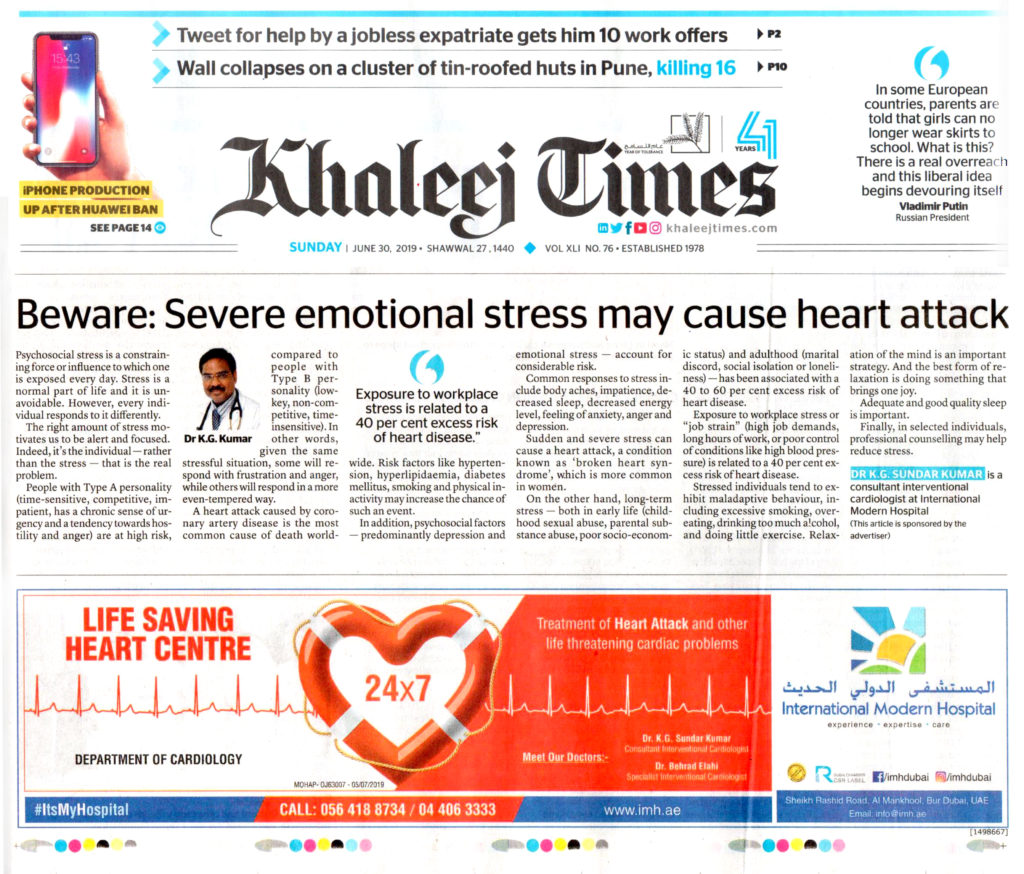Emotional stress and heart disease
Psychosocial stress is a constraining force or influence to which one is exposed to every day in life. Stress is a normal part of life and is unavoidable. But the response differs between each individual. Things that are stressful for some can be pleasurable for others or have little significance, the classic example being a roller coaster ride. Some find it a torture while thrill -seekers relish the ride. But the right amount of stress motivates us to be alert and focused.Indeed, it’s the individual rather than the stress that is the real problem. People with type A personality (Time sensitive, competitive, impatient, chronic sense of urgency, a tendency towards hostility and anger) are at high risk than people with type B personality (low key, non-competitive, time – insensitive). In other words, given the same stressful situation some will respond with frustration and anger while others will respond in a more even – tempered way.
A heart attack caused by coronary artery disease is the commonest cause of death worldwide.It involves a reduction of blood flow to the heart muscle due to the deposition of fat (plaque) in the arteries that supply blood to heart. Sudden disruption of the covering layer of the fat deposit leads to the formation of a blood clot which could cause the total blockage of the artery, which leads to a heart attack. The exact cause of the original fatty deposition is unknown.
But risk factors like:
- Hypertension,
- Hyperlipidemia,
- Diabetes mellitus,
- Smoking,
Physical inactivity increases the chance of such an event. In addition, psychosocial factors, predominantly depression and emotional stress, account for considerable risk. Although this has been known for more than a century, scientific data supporting the mechanism and therapeutic options have started to emerge only in the recent years. Stress has become part and parcel of modern life. Common responses to stress includes body
aches, impatience, decreased sleep, decreased energy level, feeling of anxiety, anger and depression. Sudden and severe stress can cause a heart attack, a condition known as ‘broken heart syndrome’ which is more common in women. Such episodes increase significantly following natural disasters like hurricane, earth quake and tsunami. On the other hand, long term stress, both in early life (childhood sexual abuse, parental substance abuse, poor socio-
economic status) and adulthood (marital discord, social isolation or loneliness) has been associated with a 40–60% excess risk of heart disease. Exposure to workplace stress or “job strain” ( high job demands, long hours of work or poor control of conditions like high blood pressure) is related to a 40% excess risk of heart disease.
In the recent years, the mechanisms of stress that lead to heart disease are better understood. For instance, heightened activity in one part of the brain (the amygdala) can lead to over production of white blood cells from bone marrow. which leads to inflammation and plaque formation in arteries. Similarly, stress increases the tendency of blood to clot. Stress also leads to release of chemicals which elevate blood pressure and blood sugar. Stressed
individuals tend to exhibit maladaptive behavior including excessive smoking, over eating, drinking too much alcohol and doing little exercise.
Emerging evidence supports the notion of counteracting stress as a critical component in the prevention and of treatment of heart disease along with the other conventional risk factors. A positive attitude and well-developed self-esteem are good defenses against stress because they help you view stress as a challenge rather than as a problem. Relaxation of the mind is an important strategy. Relaxation is an active process, that could be achieved by deep breathing, listening to music, reading a book, meditation, swimming or structured programs like Yoga. Yoga is associated with physical postures (‘Asana’), breath control (‘Pranayama’), and meditation (‘Dhyana’), all of which have been shown to reduce the negative effects of stress and improve health. The best form of relaxation, of course, is doing something that brings you joy. Once you identify what this activity is, practice relaxation through this for at
least 30 minutes a day. And don’t forget exercise – it helps in reducing stress along with burning calories. Adequate and good quality sleep is important. Finally, in selected individuals, professional counselling may help reduce stress.
Dr.K.G.Sundar Kumar,
MBBS, MD (Internal Medicine),
DM (Cardiology),
Fellowship in Interventional Cardiology (France)
Consultant Interventional Cardiologist
to know more about doctor and for booking appointment visit https://www.imh.ae/departments/cardiology/
Call : +971 4 406 3000 / 02
